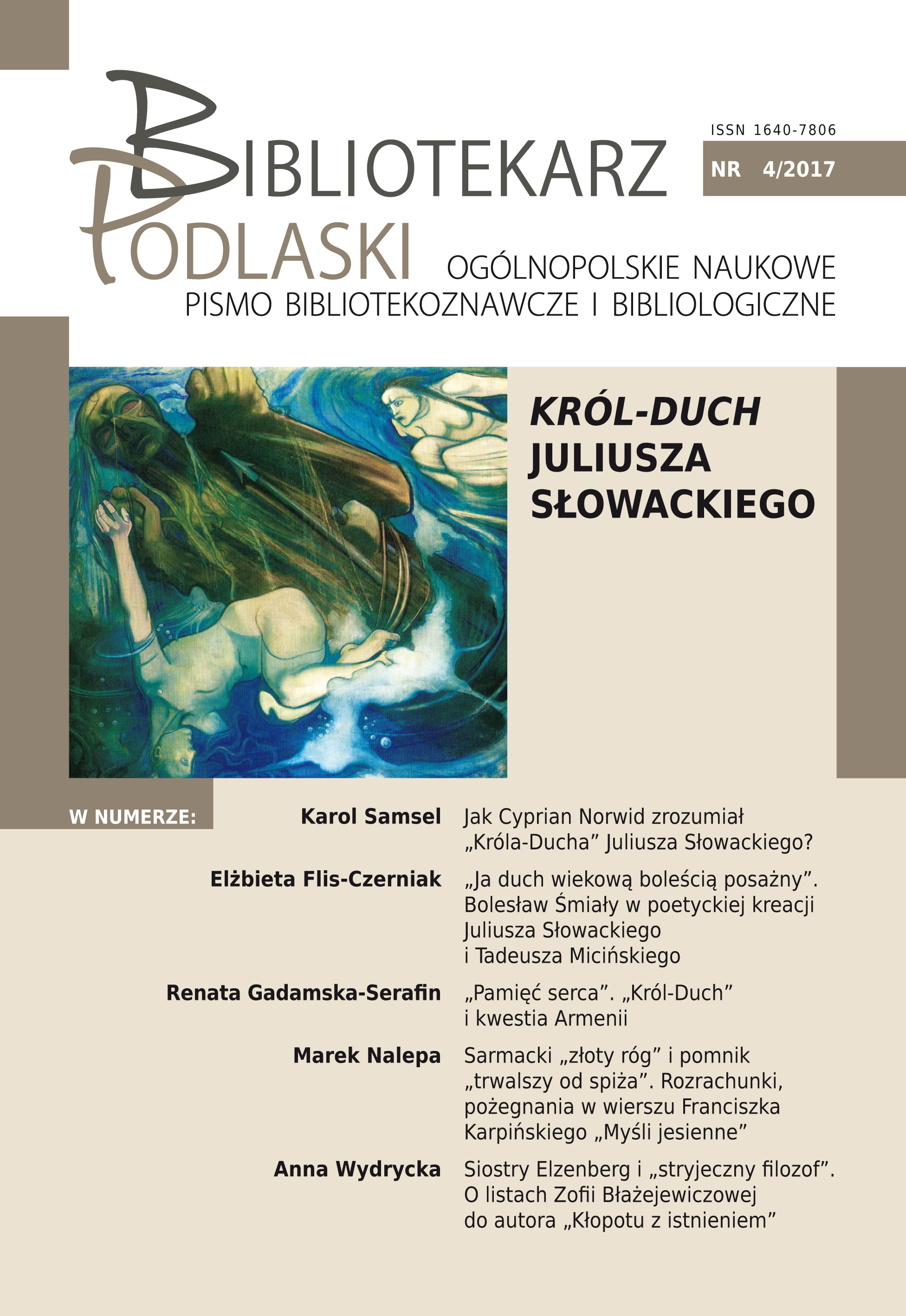Abstract
The conflict between King Bolesław II the Bold and the Bishop of Cracow, Stanisław Szczepanowski, was a noteworthy theme not only for medieval chroniclers and modern historiographers, but also for the creators of literature who recognized in these ancient events a powerful mitogenic material. One of them was Juliusz Słowacki, who in the last unfinished rhapsody of "Król-Duch" showed the main forms of the dispute from centuries as a link in the historical transformation of the spiritual „essence” of the nation in his procession towards final goals. By interpreting the poetic creation of Bolesław Śmiały, who is the hero of Słowacki’s historical and philosophical epic, the sketch’s author juxtaposes it with the creation of a royal figure in a poem by one of the most passionate Young Poland apologists of "Król-Duch" – Tadeusz Miciński. Miciński, referring to Słowacki’s historical philosophy, points to the labyrinth of categories such as wine, rebellion and sacrifice. Overwhelmed by pain, tormented by remorse, the exile king was condemned to the hell of life, opening the gates of heaven to the bishop. Within the scope of this issue, raising the issue of guilt, sin and punishment, considered in both an individual and community perspective, according to the romantic, mystical philosophy of the nation, the inner drama of the hero presented in the poem "Król w Osjaku" Miciński is placed.
References
Balicki A. E., Bolesław Śmiały i św. Stanisław Szczepanowski w poezji polskiej. Szkic, Kraków 1905.
Brzozowska S., Teatr historii. Teatr wyobraźni. Juliusz Słowacki – Tadeusz Miciński, „Wiek XIX. Rocznik Towarzystwa Literackiego im. Adama Mickiewicza” 2013, Rok VI (XLVIII), s. 7-30.
Eliade M., Aspekty mitu, przekł. P. Mrówczyński, Warszawa 1998.
Flis-Czerniak E., „Bo moc – to duch”. Juliusz Słowacki i Tadeusz Miciński „w poszukiwaniu mocy”, [w:] Spadkobiercy Juliusza Słowackiego w kraju i zagranicą (w dwusetną rocznicę urodzin), red. Eugenia Łoch, Lublin 2010, s. 145-153.
Floryńska H., Spadkobiercy Króla Ducha. O recepcji filozofii Słowackiego w światopoglądzie polskiego modernizmu, Wrocław 1976.
Gutowski W., Tadeusza Micińskiego dialog z „Królem-Duchem”, [w:] tegoż, Między inicjacją a nicością. Studia i szkice o literaturze modernizmu, Bydgoszcz 2013, s. 340-354.
Kleiner J., Juliusz Słowacki, Dzieje twórczości, wstęp i oprac. Jerzy Starnawski, Kraków 1999.
Słowacki J., Dzieła, t. V: Król-Duch, Wrocław 1959.
Lack S., „Bolesław Śmiały”. Dramat w 3 aktach Stanisława Wyspiańskiego, [w:] Wybór dzieł krytycznych, przedmowa, wybór tekstów i komentarze W. Głowala, Kraków 1980.
Linkner T., Z juweniliów Tadeusza Micińskiego, Gdańsk 2016.
Matuszewski I., Słowacki i nowa sztuka (modernizm): twórczość Słowackiego świetle poglądów estetyki nowoczesnej. Studium krytyczno-porównawcze, wstęp i oprac. S. Sandler, Warszawa 1965.
Miciński T., Do źródeł duszy polskiej, Lwów 1906.
Miciński T., Wybór poezji, wstęp i oprac. Wojciech Gutowski, Kraków 1999.
Mickiewicz A., Dzieła. Wydanie Narodowe, t. VIII: Literatura słowiańska. Kurs pierwszy, Kraków 1952.
Nawarecka L., Mistyczny sens mitu w „Królu-Duchu” Juliusza Słowackiego, Katowice 2010.
Pilch U. M., Kto jestem? O podmiocie w poetyckim dwugłosie Słowacki – Miciński, Kraków 2010.
Piwińska M., Juliusz Słowacki od duchów, Warszawa 1999.
Przybylski R., Rozhukany koń. Esej o myśleniu Juliusza Słowackiego, Warszawa 1999.
Ricoeur P., Symbolika zła, przekł. Stanisław Cichowicz i Maryna Ochab, Warszawa 2015.
Słowacki J., Dzieła, t. V: Król-Duch, oprac. Julian Krzyżanowski, Wrocław 1959.
Słowacki J., Dzieła wszystkie, t. XVI–XVII, pod red. Juliusza Kleinera i Władysława Floryana, Wrocław 1975.
Troszyński M., Słowacki. Poza kanonem, Gdańsk 2014.
Weiss T., Romantyczna genealogia polskiego modernizmu. Rekonesans, Warszawa 1974.
Zwierzyński L., Egzystencja i eschatologia. Genezyjska wyobraźnia Słowackiego, Katowice 2008.
Articles published in the “gold open access” mode on the basis of a non-exclusive license agreement between the publisher and the author. Permitted use:
- the publication may be read and stored on any device,
- the publication may be cited (with obligatory reference to the author, the title of the text, as well as the full title, bibliographic address of the issue and page of the journal)
The editorial team of “Bibliotekarz Podlaski” implements an open access policy by publishing materials in the form of the so-called Gold Open Access. From volume 42 (issue 1/2019), the journal is available under the Creative Commons license (Attribution – ShareAlike: CC BY-SA).
The key declarations of the Open Access and Open Science movement, which we fully support, are available on the CEON Open Science website.
COPYRIGHT:
The editorial team of “Bibliotekarz Podlaski” implements an open access policy by publishing materials in the form of the so-called Gold Open Access. The journal is available under the Creative Commons license – Attribution – ShareAlike 4.0: International: CC BY-SA 4.0).
The key declarations of the Open Access and Open Science movement, which we fully support, are available on the CEON Open Science website.
“Bibliotekarz Podlaski” allows its readers to read, download, copy, distribute, print, search and link to the full content of articles. We enable full, immediate, unlimited (both in a territorial, temporal and technical sense) open access to all published content, in accordance with the principle that freely available research increases and accelerates the global development of science and the exchange of knowledge.
The editorial team of “Bibliotekarz Podlaski” encourages authors to place articles published in the journal in open repositories (after the review or the final version of the publisher), provided that a link to the journal’s website is provided.
The journal does not charge the authors any fees for accepting and publishing their texts.


